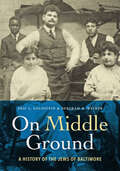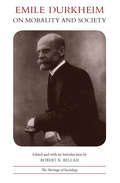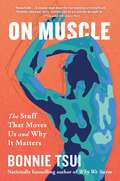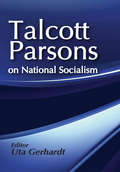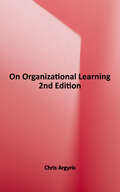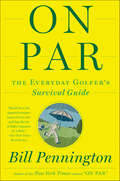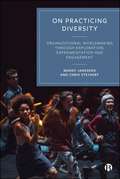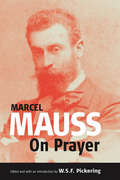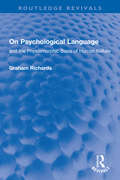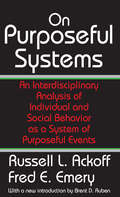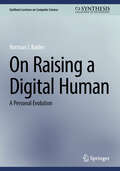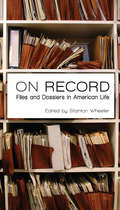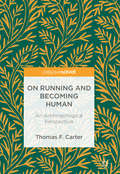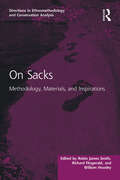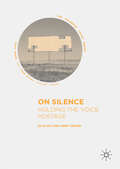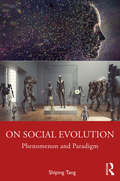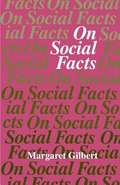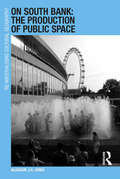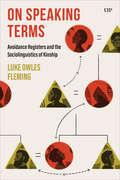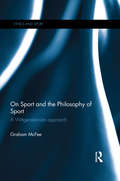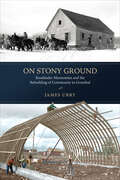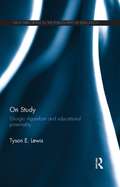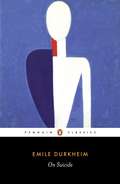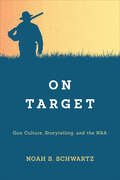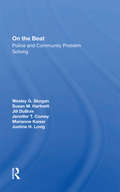- Table View
- List View
On Middle Ground: A History of the Jews of Baltimore
by Eric L. Goldstein Deborah R. WeinerA model of Jewish community history that will enlighten anyone interested in Baltimore and its past.Winner of the Southern Jewish Historical Society Book Prize by the Southern Jewish Historical Society; Finalist of the American Jewish Studies Book Award by the Jewish Book Council National Jewish Book AwardsIn 1938, Gustav Brunn and his family fled Nazi Germany and settled in Baltimore. Brunn found a job at McCormick’s Spice Company but was fired after three days when, according to family legend, the manager discovered he was Jewish. He started his own successful business using a spice mill he brought over from Germany and developed a blend especially for the seafood purveyors across the street. Before long, his Old Bay spice blend would grace kitchen cabinets in virtually every home in Maryland. The Brunns sold the business in 1986. Four years later, Old Bay was again sold—to McCormick. In On Middle Ground, the first truly comprehensive history of Baltimore’s Jewish community, Eric L. Goldstein and Deborah R. Weiner describe not only the formal institutions of Jewish life but also the everyday experiences of families like the Brunns and of a diverse Jewish population that included immigrants and natives, factory workers and department store owners, traditionalists and reformers. The story of Baltimore Jews—full of absorbing characters and marked by dramas of immigration, acculturation, and assimilation—is the story of American Jews in microcosm. But its contours also reflect the city’s unique culture.Goldstein and Weiner argue that Baltimore’s distinctive setting as both a border city and an immigrant port offered opportunities for advancement that made it a magnet for successive waves of Jewish settlers. The authors detail how the city began to attract enterprising merchants during the American Revolution, when it thrived as one of the few ports remaining free of British blockade. They trace Baltimore’s meteoric rise as a commercial center, which drew Jewish newcomers who helped the upstart town surpass Philadelphia as the second-largest American city. They explore the important role of Jewish entrepreneurs as Baltimore became a commercial gateway to the South and later developed a thriving industrial scene.Readers learn how, in the twentieth century, the growth of suburbia and the redevelopment of downtown offered scope to civic leaders, business owners, and real estate developers. From symphony benefactor Joseph Meyerhoff to Governor Marvin Mandel and trailblazing state senator Rosalie Abrams, Jews joined the ranks of Baltimore’s most influential cultural, philanthropic, and political leaders while working on the grassroots level to reshape a metro area confronted with the challenges of modern urban life. Accessibly written and enriched by more than 130 illustrations, On Middle Ground reveals that local Jewish life was profoundly shaped by Baltimore’s "middleness"—its hybrid identity as a meeting point between North and South, a major industrial center with a legacy of slavery, and a large city with a small-town feel.
On Morality and Society: Selected Writings
by Robert N. Bellah Emile DurkheimEmile Durkheim is best known in this country as a great sociologist and methodologist. Yet it was Durkheim's reflections on morality and society that spoke most deeply of his vital concerns. In his informative introduction to this work, Robert N. Bellah describes Durkheim as moralist, philosopher, theologian, and prophet, as well as sociologist, and the selections in this volume are representative of these aspects of Durkheim's many-faceted scholarship. The first two selections of the volume set the context for the development of Durkheim's sociology of morality. Section I, "The French Tradition of Social Thought," gives Durkheim's picture of how his sociology is to be situated relative to the general French tradition. Section II, "Sociology and Social Action," shows Durkheim grappling with moral and political issues in his society and indicates the immediate social context of his thinking. The remaining selections indicate some of the major substantive areas of Durkheim's sociology of morality. Section III, taken from The Division of Labor in Society, demonstrates his basically evolutionary approach to the development of moral norms in society. Section IV, "The Learning of Morality," gives examples of Durkheim's work on socialization. Section V, "Social Creativity," deals with the important question of how new moral norms arise in society.
On Muscle: The Stuff That Moves Us and Why It Matters
by Bonnie TsuiFrom the bestselling author of Why We Swim comes a mind-expanding exploration of muscle that will change the way you think about what moves us through the world. &“Remarkable . . . A singular book about the true meanings of strength and flexibility, about our ability to define who we are and who we might be.&” —Ed Yong, New York Times bestselling author of An Immense World and I Contain Multitudes In On Muscle, Bonnie Tsui brings her signature blend of science, culture, immersive reporting, and personal narrative to examine not just what muscles are but what they mean to us. Cardiac, smooth, skeletal—these three different types of muscle in our bodies make our hearts beat; push food through our intestines, blood through our vessels, babies out the uterus; attach to our bones and allow for motion. Tsui also traces how muscles have defined beauty—and how they have distorted it—through the ages, and how they play an essential role in our physical and mental health. Tsui introduces us to the first female weightlifter to pick up the famed Scottish Dinnie Stones, then takes us on a 50-mile run through the Nevada desert that follows the path of escape from a Native boarding school—and gives the concept of endurance new meaning. She travels to Oslo, where cutting-edge research reveals how muscles help us bounce back after injury and illness, an important aspect of longevity. She jumps into the action with a historic Double Dutch club in Washington, D.C., to explain anew what Charles Darwin meant by the brain-body connection. Woven throughout are stories of Tsui&’s childhood with her Chinese immigrant artist dad—a black belt in karate—who schools her from a young age in a kind of quirky, in-house Muscle Academy. On Muscle shows us the poetry in the physical, and the surprising ways muscle can reveal what we&’re capable of.
On National Socialism (Social Institutions And Social Change Ser.)
by Talcott ParsonsDuring the years between the publication of the first of his two major works, The Structure of Social Action (1937), and the writing of his second, The Social System (1951), Talcott Parsons was primarily engaged in political activity through the Office of Strategic Services in its efforts to bring about the defeat of the Third Reich and to set the stage for a democratic reconstruction of postwar Germany. Beyond Parsons' analytic skills the essays reveal a dedicated liberal scholar, far removed from the stereotypes with which he came to be pilloried by later critics. The essays in this collection are the by-products of that special period of intense commitment. They reflect a single dominant theme: National Socialist Germany is seen as a tragically flawed social system but one requiring the same rigorous analysis Parsons brought to more normal and normative systems. Since virulent authoritarianism and even more virulent anti-Semitism were the dominant traits of that system as he saw it, Parsons dedicated many pages to each aspect. While he did not know the full horror of the Nazi ""war against the Jews"" he was able to develop a theoretical framework that continues to be a foundation stone for the analysis of national socialism. Gerhardt's editorial labors in the Parsons archive at Harvard have yielded nothing less than a ""new book"" by the foremost American sociological theorist of his time. This collection of both published and unpublished writings conveys Parsons' cohesive intent. To these otherwise fugitive and neglected essays Gerhardt contributes an introductory essay of her own: in part biography, in part intellectual and social history. She discovered Parsons work on National Socialism while studying his sociology of the professions and his use of medical practice to demonstrate how social science could become an antidote for fascism and authoritarianism. Uta Gerhardt is director of the Medical Sociology Unit at Justu
On Organizational Learning
by Chris ArgyrisThis book is essential for anyone who needs to understand how organizations work, evolve, and learn. In this new edition, Argyris discusses vital topics of current management research, such as tacit knowledge and management, so reflecting the evolving field of organizational learning. It brings together the thinking of one of the world's leading management thinkers: especially in the area of action learning.
On Par: The Everyday Golfer's Survival Guide
by Bill PenningtonBill Pennington, author of the beloved and widely read &“On Par&” golf column for the New York Times, knows how to interpret the experts and pros for the rest of us. For years, he has traveled the globe in search of golf&’s essentials—those basic principles, those elusive truths (and who are we kidding, any trick or quick fix he can pick up along the way) that will improve anyone&’s game. He has consulted the world&’s leading golf instructors as well as countless caddies, groundskeepers, parking lot attendants, and bartenders. He has played rounds with Tiger Woods, Annika Sorenstam, and Justin Timberlake. He has sought the advice of psychiatrists, physicists, economists, zen masters. And on a particularly bad golf outing, he has even discussed the fickleness of golf with a quite helpful raccoon.On Par captures it all: From equipment and instruction, to the rules and language of golf, to camaraderie and psychology, to the short game/long game debate, Pennington informs and entertains as he gets to the essence of this mercurial game, including golf&’s holy grail, the hole in one. Part instruction, part education, part therapy, and shot through with Pennington&’s trademark wit, this is a book for everyone who has ever felt the game&’s distinct pull—and slice.
On Practicing Diversity: Organizational Worldmaking through Exploration, Experimentation, and Engagement
by Chris Steyaert Maddy JanssensHow can diversity be practiced without reinforcing the very inequalities it aims to dismantle? In this book, Maddy Janssens and Chris Steyaert address this pressing question by critically examining the assumptions behind current diversity initiatives and turning to critical practice theory and queer theory for novel insights. Through imaginative concepts, inspiring illustrations, and an integrative case study within the dance world, the authors articulate the ‘conditions of possibility’ for a fresh, impactful alternative. This book advocates for a shift from individual efforts to collective practices, proposing a politics of organizational worldmaking oriented at multiplicity – a practicing of diversity that aspires to transformative change into livable and just work lives.
On Prayer
by W.S.F. Pickering Marcel MaussMarcel Mauss (1872-1950) never completed his Doctoral thesis on prayer. Yet his scarcely mentioned introduction (Books I and II) of 176 pages and privately printed in 1909, can be seen as some of his most important work. His argument that much of prayer is a social act will be of great interest to anthropologists, sociologists and theologians.<P><P> Here, the first English translation to be published, is preceded by a general introduction by W.S.F.Pickering and finally a specific commentary on Mauss's use of ethnographic material.
On Psychological Language: and the Physiomorphic Basis of Human Nature (Routledge Revivals)
by Graham RichardsFirst published in 1989, On Psychological Language and the Physiomorphic Basis of Human Nature was written to provide a new and controversial analysis of the nature of psychological language. The book argues that psychological concepts of all kinds are ultimately derived from concepts about the external world, so that ‘human nature’ is nothing more than ‘internalized Nature’. It draws attention to problems regarding the nature of linguistic reference, and puts forward a route for considering human psychological evolution, raising questions about the nature of psychology as a discipline and its relationship with the physical sciences. This ‘physiomorphic theory’ challenged ways of thinking about psychological language at the time of original publication. Interdisciplinary in its approach, On Psychological Language and the Physiomorphic Basis of Human Nature has enduring relevance for those with an interest in psychology, anthropology, philosophy, and linguistics.
On Purposeful Systems: An Interdisciplinary Analysis of Individual and Social Behavior as a System of Purposeful Events (Systems Inquiry Ser.)
by Fred EmeryThis book provides an innovative foundation for looking at human and social behavior u as a system of purposeful (teleological) events. It uses a systems theoretical approach for the study of these phenomena, and illustrates and extends general systems theory.Part One develops the concepts of traditional mechanism from which, successively, the concepts of "function," "choice," "goal-seeking," and "purposefulness" are derived, leading to a quantitative formulation of "personality". Part Two provides an analysis of aspects of purposeful behavior and personality, and Part Three explores the interaction of purposeful systems. Part Four is concerned with the study of social groups and ideal-seeking behavior. Finally, structural concepts underpinning the theoretical system are redefined in technological terms, thus demonstrating the non-vicious circularity and interdependence of all scientific concepts.
On Raising a Digital Human: A Personal Evolution (Synthesis Lectures on Computer Science)
by Norman I. BadlerThis book tells the story of building digital virtual human models in the context of the background, choices, and occurrences that shaped the author's own involvement and personal evolution. Such digital models found motivating applications in engineering, anthropology, medical, and group simulation problems, and numerous connections to other disciplines informed and enriched their design, development, and deployment. This personal perspective on developments in the field is enhanced by extensive citations that provide pointers into relevant literature, recognize the contributions of co-authors and collaborators, and give external evidence for claims. Both academic and corporate interest in virtual beings has exploded in recent years, and while this book does not survey the current state of the art it is an essential window into how the field arrived where it is today. The technical discussions throughout the book are deliberately accessible with extensive references to the literature for further reading. This book will be of interest to readers who want to understand the history of virtual human beings, how they evolved, and especially how they must address numerous human characteristics to achieve any sense of "human-ness."
On Record: Files and Dossiers in American Life
by Stanton WheelerOn Record provides descriptive accounts of record-keeping in a variety of important organizations: schools and universities; consumer credit agencies, general business organizations, and life insurance companies; military and security agencies; the Census Bureau and the Social Security Administration; public welfare agencies, juvenile courts, and mental hospitals. It also examines the legal status of records. The authors address questions such as: Who determines what records are kept? Who has access to the records? To what extent do the records follow an individual? What are some of the dangers and pitfalls in record-keeping? Throughout the volume, the authors show a concern for an appropriate balance between the need for information about people and protection against undue invasions of privacy. The introduction of electronic databases since the original publication of this book makes the issues raised in this seminal collection even more timely.
On Running and Becoming Human: An Anthropological Perspective
by Thomas F. CarterHow does the simple act of running make us human? As a form of enskilled movement that shapes how we perceive our surroundings, running enacts a mindful bodily engagement with the world, an engagement that generates our very minds through perceptual learning. Thomas F. Carter examines the interrelated aspects of a runner’s being—mind, body, and environs—to illustrate that the skillful act of locomotion is one of principle ways that we as human beings become integral parts of the larger world. Synthesizing recent developments in neuroscience, anthropology, and philosophy of mind, On Running proves there is more to running than merely clocking up the miles.
On Sacks: Methodology, Materials, and Inspirations (Directions in Ethnomethodology and Conversation Analysis)
by Robin James SmithThis book is devoted to the reintroduction of the remarkable approach to sociological inquiry developed by Harvey Sacks. Sacks’s original analyses – concerned with the lived detail of action and language-in-interaction, discoverable in members’ actual activities – demonstrated a means of doing sociology that had previously seemed impossible. In so doing, Sacks provided for highly technical, detailed, yet stunningly simple solutions to some of the most trenchant troubles for the social sciences relating to language, culture, meaning, knowledge, action, and social organisation. In this original collection, scholars working in a range of different fields, including sociology, human geography, communication and media studies, social psychology, and linguistics, outline the ways in which their work has been inspired, influenced, and shaped by Sacks’s approach, as well as how their current research is taking Sacks’s legacy forward in new directions. As such, the collection is intended to provide both an introduction to, and critical exploration of, the work of Harvey Sacks and its continued relevance for the analysis of contemporary society.
On Silence: Holding the Voice Hostage (The Palgrave Lacan Series)
by Ed Pluth Cindy ZeiherThis book promotes a Lacanian approach to silence, arguing that Lacanian psychoanalysis is distinctive for putting a high value on both silence and language. Unlike other disciplines and discourses the authors do not treat silence as a mystical-impossible beyond, at the cost of demoting the value of language and thought. Rather than treating silence with awe and wonder, this book puts silence to work, and it does so in order to deal with the inevitable alienation that comes with becoming speaking-beings. This illuminating book will be of great interest to scholars of Lacan and the psychosocial, as well as more broadly to philosophers and linguists alike.
On Social Evolution: Phenomenon and Paradigm
by Shiping TangTang provides a coherent and systematic exploration of social evolution as a phenomenon and as a paradigm. He critically builds on existing discussions on social evolution, while drawing from a wide range of disciplines, including archaeology, evolutionary anthropology, sociology, economics, political science, the philosophy of social sciences, and evolutionary biology. Clarifying the relationship between biological evolution and social evolution, Tang lays bare the ontological and epistemological principles of the social evolutionary paradigm. He also presents operational principles and tools for deploying this paradigm to understand empirical puzzles about human society. This is a vital resource for students, practitioners, and philosophers of all social sciences.
On Social Facts
by Margaret GilbertAre social groups real in any sense that is independent of the thoughts, actions, and beliefs of the individuals making up the group? Using methods of philosophy to examine such longstanding sociological questions, Margaret Gilbert gives a general characterization of the core phenomena at issue in the domain of human social life. After developing detailed analyses of a number of central everyday concepts of social phenomena--including shared action, a social convention, a group's belief, and a group itself--she proposes that the core social phenomena among human beings are "plural subject" phenomena. In her analyses Gilbert discusses the work of such thinkers as Emile Durkheim, Georg Simmel, Max Weber, and David Lewis. "Gilbert's book aims to . . . exhibit some general and structural features of the conceptual scheme in terms of which we think about social groups, collective action, social convention, and shared belief. . . . [It] offers an important corrective to individualistic thinking in the social sciences. . . . "--Michael Root, Philosophical Review "In this rich and rewarding work, Margaret Gilbert provides a novel and detailed account of our everyday concepts of social collectivity. In so doing she makes a seminal contribution to . . . some vexed issues in the philosophy of social science. . . . [An] intellectually pioneering work. "--John D. Greenwood, Social Epistemology
On South Bank: The Production Of Public Space
by Alasdair J.H. JonesTensions over the production of urban public space came to the fore in summer 2013 with mass protests in Turkey sparked by a plan to redevelop Taksim Gezi Park, Istanbul. In London, concomitant proposals to refurbish an area of the ’South Bank’ historically used by skateboarders were similarly met by staunch opposition. Through an in-depth ethnographic examination of London’s South Bank, this book explores multiple dimensions of the production of urban public space. Drawing on user accounts of the significance of public space, as well as observations of how the South Bank is ’practised’ on a daily basis, it argues that public space is valued not only for its essential material characteristics but also for the productive potential that these characteristics, if properly managed, afford on a daily basis. At a time when policy-makers, urban planners and law enforcement authorities simultaneously grapple with pressures to deal with social 'problems' (such as street drinking, vandalism, and skateboarding) and accusations that new modes of urban planning and civic management infringe upon civil liberties and dilute the publicity of ’public’ space, this book offers an insightful account of the daily exigencies of public spaces. In so doing, it questions the utility of the public/private binary for our understanding both of common urban space and of different sets of social practices, and points towards the need to be attentive to productive processes in how we understand and experience urban open space as public.
On Speaking Terms: Avoidance Registers and the Sociolinguistics of Kinship (Studies in the Anthropology of Language, Sign, and Social Life)
by Luke FlemingWhy are kin, in societies all over the world, divided into “joking” and “avoidance” relations? Foundational figures in the human sciences, from E.B. Tylor and Alfred Radcliffe-Brown to Sigmund Freud and Claude Lévi-Strauss, have sought to explain why some classes of kin are normatively expected to prank and tease one another while others must studiously avoid each other’s presence. In this extensively researched comparative study, linguistic anthropologist Luke Owles Fleming offers a bold new answer to this problem. With a particular focus on avoidance relationships, On Speaking Terms argues that in order to understand cross-cultural convergences in the patterning of kinship-keyed comportments, we must attend to the sociolinguistic codes through which kinship relationships are enacted. Drawing on ethnographic data from more than one hundred different societies, the book documents and analyses parallels in the linguistic and non-verbal signs through which avoidance relationships are experientially realized. With dedicated discussions of Aboriginal Australian “mother-in-law languages,” name and word tabooing practices, pronominal honorification, and non-verbal strategies of interactional and sensorial avoidance, it reveals recurrent sociolinguistic patterns attested in kinship avoidance. In demonstrating the vital role of sociolinguistic codes for transforming kinship categories into phenomenologically rich relationships, On Speaking Terms makes an important contribution to the anthropology of kinship.
On Sport and the Philosophy of Sport: A Wittgensteinian Approach (Ethics and Sport)
by Graham McFeeWhat is the ‘philosophy of sport’? What does one do to count as a practitioner in the philosophy of sport? What conception of philosophy underpins the answer to those questions? In this important new book, leading sport philosopher Graham McFee draws on a lifetime’s philosophical inquiry to reconceptualise the field of study. The book covers important topics such as Olympism, the symbolisation of argument, and epistemology and aesthetics in sport research; and concludes with a section of ‘applied’ sport philosophy by looking at rules and officiating. Using a Wittgensteinian framework, and employing a rich array of sporting examples throughout, McFee challenges the assumptions of traditional analytic philosophy regarding the completeness required of concepts and the exceptionlessness required of philosophical claims, providing the reader with a new set of tools with which to approach this challenging subject. On Sport and the Philosophy of Sport is fascinating and important reading for any serious students or researchers of sport philosophy.
On Stony Ground: Russländer Mennonites and the Rebuilding of Community in Grunthal (Transnational Mennonite Studies #2)
by James UrryOn Stony Ground presents a historical ethnographic account of a generation of Mennonites from the Soviet Union who, following Russia’s revolution and civil war, immigrated to Manitoba during the 1920s. James Urry examines how they came to terms with a new land and with their new neighbours, including other Mennonites, Ukrainians, French Canadians, and Indigenous Peoples. The book discusses the impact of the Great Depression and how the immigrants struggled with their identity in Canada as Hitler and Stalin rose to power in Germany and the USSR. It reveals the immigrants’ desire to maintain their faith, language, and culture while encouraging their children to take advantage of an education conducted mainly in English. On Stony Ground explores how prosperity following the Second World War helped the immigrants to build a community in conjunction with others, including Mennonites and non-Mennonites, and to accept their new home in Canada.
On Study: Giorgio Agamben And Educational Potentiality (New Directions in the Philosophy of Education)
by Tyson E. LewisIn an educational landscape dominated by discourses and practices of learning, standardized testing, and the pressure to succeed, what space and time remain for studying? In this book, Tyson E. Lewis argues that studying is a distinctive educational experience with its own temporal, spatial, methodological, aesthetic, and phenomenological dimensions. Unlike learning, which presents the actualization of a student’s "potential" in recognizable and measurable forms, study emphasizes the experience of potentiality, freed from predetermined outcomes. Studying suspends and interrupts the conventional logic of learning, opening up a new space and time for educational freedom to emerge. Drawing upon the work of Italian philosopher and critical theorist Giorgio Agamben, Lewis provides a conceptually and poetically rich account of the interconnections between potentiality, freedom, and study. Through a mixture of educational critique, phenomenological description, and ontological analysis, Lewis redeems study as an invaluable and urgent educational experience that provides alternatives to the economization of education and the cooptation of potentiality in the name of efficiency. The resulting discussion uncovers multiple forms of study in a variety of unexpected places: from the political poetry of Adrienne Rich, to tinkering classrooms, to abandoned manifestos, and, finally, to Occupy Wall Street. By reconnecting education with potentiality this book provides an educational philosophy that undermines the logic of learning and assessment, and turns our attention to the interminable paradoxes of studying. The book will be key reading for scholars in the fields of educational philosophy, critical pedagogy, foundations of education, composition and rhetoric, and critical thinking and literacy studies.
On Suicide
by Emile DurkheimEmile Durkheim's On Suicide (1897) was a groundbreaking book in the field of sociology. Traditionally, suicide was thought to be a matter of purely individual despair but Durkheim recognized that the phenomenon had a social dimension. He believed that if anything can explain how individuals relate to society, then it is suicide: Why does it happen? What goes wrong? Why do certain social, religious or racial groups have higher incidences of suicide than others? As Durkheim explored these questions he became convinced that abnormally high or low levels of social integration lead to an increased likelihood of suicide. On Suicide was the result of his extensive research. Divided into three parts - individual reasons for suicide, social forms of suicide and the relation of suicide to society as a whole - Durkheim's revelations have fascinated, challenged and informed readers for over a century.
On Target: Gun Culture, Storytelling, and the NRA
by Noah S. SchwartzThe National Rifle Association (NRA) is an important actor in the American gun debate. While popular explanations for the group’s influence often focus on the NRA’s lobbying and campaign donations, it receives lesser attention for the mass mobilization efforts that make these political endeavours possible. On Target explores why the NRA is so influential and how we can understand the group’s impact on firearms policy in the United States. The book looks at how the NRA both draws upon and shapes historical meta-narratives regarding the role of firearms in America’s national identity and how this is part of a larger effort to expand the community of gun owners. Noah S. Schwartz demonstrates how the NRA portrays a vision of the past through events such as its annual meeting; communications such as American Rifleman magazine and NRA TV; and points of contact including the National Firearms Museum. Based on fieldwork in Indiana and Virginia, including participant observation at NRA events and firearm safety classes, thematic analysis of audio-visual material, and interviews with NRA executives and members, On Target sheds light on the ways in which the NRA tells stories to build and mobilize a politically motivated network of gun owners.
On The Beat: Police And Community Problem Solving
by Wesley G Skogan Susan M. Hartnett Jennifer T. Comey Jill Dubois Marianne KaiserThis book focuses on how Chicago actually tried to formulate and implement problem solving as part of a thoroughgoing change in its style of policing. It describes the five-step problem-solving model that the city developed for tackling neighborhood problems ranging from graffiti to gang violence.
